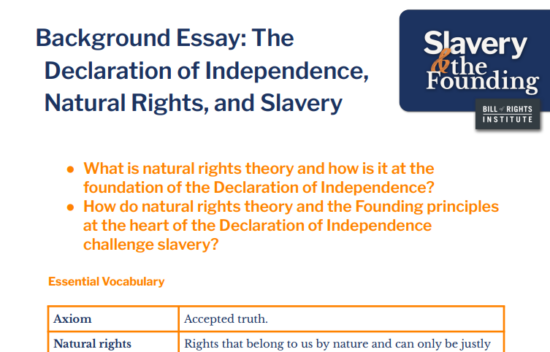Oral Histories of Formerly Enslaved Individuals – Primary Source
Oral Histories of Formerly Enslaved Individuals | Primary Source
Guiding Questions
- What was the experience of formerly enslaved individuals during Reconstruction?
- How did Reconstruction impact the lives of formerly enslaved people and their families?
Objectives
- I can assess the broad themes that defined the experience of Blacks living in the South during Reconstruction
Sources:
Background Information
When the Civil War ended, millions of formerly enslaved individuals were emancipated from bondage. While they were free from the injustice of slavery, they quickly encountered huge challenges of living in a society that built up a system of white supremacy in the form of Jim Crow laws, intimidation, and outright violence.
During the early decades of the twentieth century, significant efforts were made to interview formerly enslaved individuals to learn about their experiences living in bondage as well as during Reconstruction and beyond. The last excerpt is from Abram Colby, a former slave who was elected to the Georgia legislature and called to testify before Congress about violence in the South.
Source: https://tile.loc.gov/storage-services/service/mss/mesn/mesn-143/mesn-143.pdf
Oral Histories of Formerly Enslaved Individuals, Anges James
| Text | Vocabulary and Context |
| I ‘member when freedom come, [my former owner Marse] said, ‘You is all free, but you can work on and make dis crop of corn and cotton; den I will divide up wid you when Christmas comes.’ Dey all worked, and when Christmas come, Marse told us we Could get on and shuffle for ourselves, and he didn’t give us anything. We had to steal corn out of de crib. We prized de ears out between ae cracks and took dem home and parched dem. We would have to eat on dese for several days… | A system known as sharecropping emerged at the end of the Civil War in which many Blacks in the South worked, sometimes for their former owners. Under sharecropping, workers would receive a portion of the crops they grew on someone else’s land. While Black Americans were able to finally enjoy the fruits of their own labor, their sharecropping contracts frequently were unjust that denied them the chance to have any more than the bare minimum. |
| Right atter de war de Ku Klux started. I ‘member dem when dey would march up and down de road. Dey marched most at night, and we could hear de horses for a long distance as deir feet struck de ground… | |
| I think slavery was good in some ways and bad in others. I was better off den dan I am now… I member something ‘ bout 40 acres of land and a mule dat de slaves would get, but never come anything about it. When freedom come most of de slaves hired out as wage hands, cutting wood and working on farms or any odd jobs dey could get…We didn’t get any money in slavery time, but got plenty to eat; and atter de war, we got a little money and a little to eat.” | Near the end of the Civil War, Union general William T. Sherman issued an order to give freed families forty acres and a mule in Southern states. While some did receive land, ultimately, most Blacks never received anything. |
Oral Histories of Formerly Enslaved Individuals, Henry Blake
| “After freedom, we worked on shares a while. Then we rented. When we worked on shares, we couldn’t make nothing, just overalls and something to eat. Half went to the other man and you would destroy your half if you weren’t careful. A man that didn’t know how to count would always lose. He might lose anyhow. They didn’t give no itemized statement. No, you just had to take their word. They never give you no details. They just say you owe so much. No matter how good account you kept, you had to go by their account and now… | shares: sharecropping |
| They’d keep you in debt. They were sharp. Christmas come, you could take up twenty dollar, in somethin’ to eat and much as you wanted in whiskey. You could buy a gallon of whiskey. Anything that kept you a slave because he was always right and you were always wrong it there was difference. If there was an argument, he would get mad and there would be a shooting take place.” |
Oral Histories of Formerly Enslaved Individuals, Abram Colby
| On the 29th of October 1869, [the Klansmen] broke my door open, took me out of bed, took me to the woods and whipped me three hours or more and left me for dead. They said to me, “Do you think you will ever vote another damned Radical ticket?” I said, “If there was an election tomorrow, I would vote the Radical ticket.” They set in and whipped me a thousand licks more, with sticks and straps that had buckles on the ends of them. | licks: whips |
| Some [of the Klansmen] are first-class men in our town. One is a lawyer, one a doctor, and some are farmers. They had their pistols and they took me in my night-clothes and carried me from home. They hit me five thousand blows… | |
| The worst thing was my mother, wife and daughter were in the room when they came. My little daughter begged them not to carry me away. They drew up a gun and actually frightened her to death. She never got over it until she died. That was the part that grieves me the most. |

